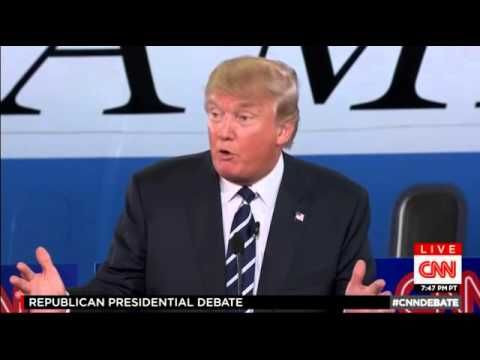Republican Debate: Donald Trump Says Vaccines Caused An 'Autism Epidemic,' Wants To Change How We Immunize

Donald Trump decided to take on the role of doctor in Wednesday’s Republican debate, boldly stating that we need to rethink the way we vaccinate children. Though he claims to be “totally in favor of vaccines,” Trump also stated that from his own personal experience, vaccinations can lead to autism.
He describes instances of autism as “an epidemic” that has become “out of control,” crediting the high doses of vaccinations that we give to children as the culprit. “You take a baby in…you take this little beautiful baby and you pump it with what looks like it’s meant for a horse, not a child,” he said. “People that work for me, just the other day, 2-year-old, 2-and-a-half-year-old, beautiful child, they went to have a vaccine and came back and a week later they got a tremendous fever, got very sick, and now is autistic.”
Adding to this, Trump said that for his own children, he chose to spread out vaccinations so that they weren’t getting such high doses all at once. Dr. Ben Carson, a former pediatric neurosurgeon, rebutted Trump’s claim by saying that “extremely well documented proof” exists refuting claims that vaccination can in any way cause autism.
And while Trump may be trying on many different hats lately, he may want to stay away from doctoring. A 2014 study published in the journal Vaccine added to an overwhelming body of evidence by examining many studies that have analyzed the link between autism and vaccination. A total of 1,256,407 children were involved in these studies, along with 9,920 children evaluated from five case-control studies; ultimately, the researchers found no evidence for vaccinations causing autism spectrum disorders, nor was their evidence that the chemical thimerosal found in vaccinations, or mercury was to blame for ASD.
Many people cite a 1998 study published in the journal Lancet as the start of the association between vaccinations and autism, but that study was found to be highly flawed; not only was it not based in statistics, it did not involve a control group, it relied too heavily on memory and it made vague conclusions proven to not be statistically valid.
To counter Trump’s claim that his employee's baby developed autism shortly after receiving a vaccination, the Centers for Disease Control and Prevention notes that many children start to show signs of autism around the time vaccinations are required. They also note that the risk of remaining unvaccinated, or prolonging becoming fully vaccinated has more risks than benefits. Young children left unvaccinated are more vulnerable to developing preventable diseases that could lead to hospitalizations, disability, and even death. Delaying vaccinations also inhibits herd immunity, a phenomenon known to keep those too young to receive their shots from developing these diseases as well.
Source: Taylor L, Swerdfeger A, Eslick G. Vaccines are not associated with autism: An evidence-based meta-analysis of case-control and cohort studies. Vaccine. 2015.



























